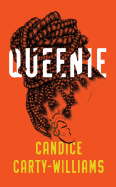
Twenty-five-year-old Queenie Jenkins is in a downward spiral. Tom, her boyfriend of three years, has asked for a "clean break" (which she heard as "take a break"). She's straddling the world of her Jamaican British family and her job on a mostly white newspaper staff. In Candice Carty-Williams's debut novel, Queenie, the eponymous heroine's trials are heartbreaking but hilarious, thanks to her self-deprecating first-person narration.
The first in her family to graduate from college, Queenie knows she overcame the odds: her long-suffering mother, an abusive stepfather, grandparents who are there for her but culturally distant. She hopes to write Black Lives Matter pieces for her paper. But Tom's rejection ignites all her self-doubts. She agrees to a series of OkCupid dates and a brief office affair, encounters described in titillating and often humorous detail. Wooed as "chocolate girl," she wonders if her life has become "men in droves calling me confectionary." Her health deteriorates and she has panic attacks. Group texts with her three loyal best friends (known as "The Corgis," because "the Queen loves her Corgis and they all support her") are loving and funny, and these women keep her afloat, though, she says, "there's too much wrong with me." Eventually she sees a therapist, who helps to right her course.
At one point in Queenie's chaos, Grandma accuses her, "Lie you ah' tell," in her delightful patois. Surely the young woman errs, but as normally reserved Grandad concludes, "You're full of fight, Queenie. Full of fight." Even when she's making the most dubious choices, Queenie inspires hope and affection. --Cheryl Krocker McKeon, manager, Book Passage, San Francisco

